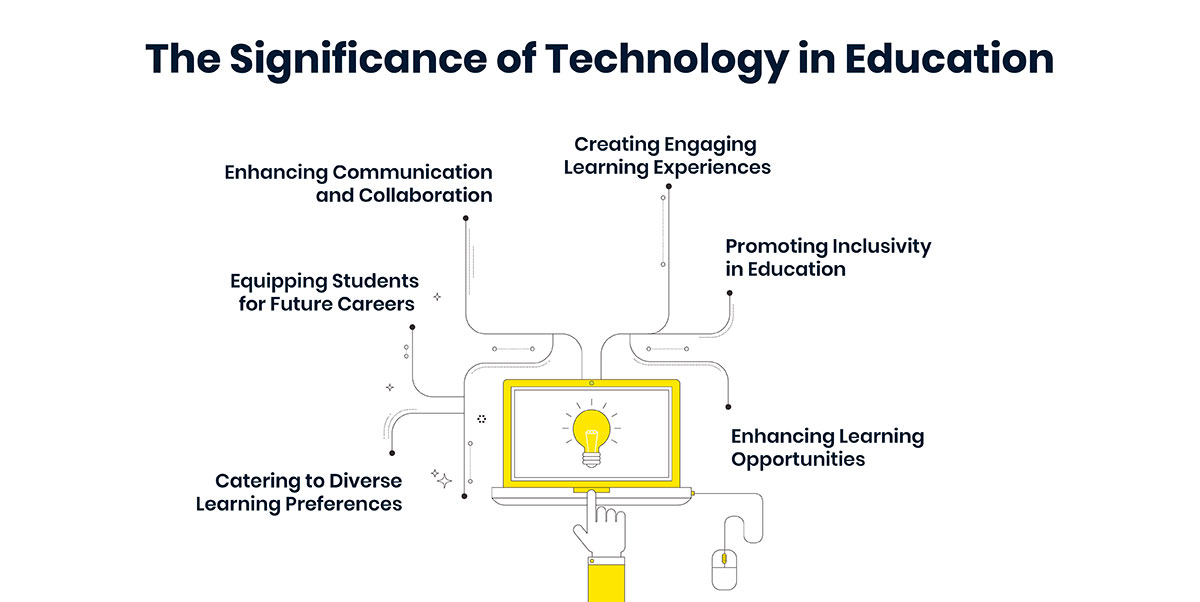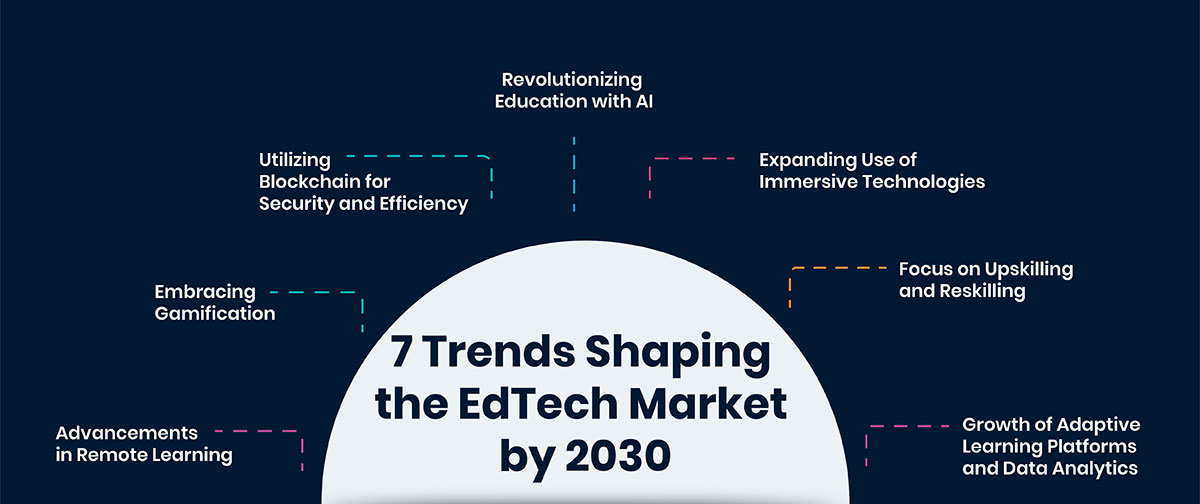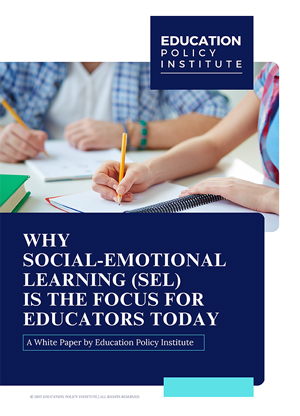The accelerating digital revolution is set to profoundly impact education technology (EdTech), influencing lives and economies worldwide. EdTech is bridging workforce gaps and addressing the growing focus on mental health in education, affecting all learners, from children entering school to adults seeking to upskill for future careers.
In the coming decade, 800 million K-12 students and 350 million post-secondary graduates will emerge globally, with education spending projected to reach $10 trillion by 2030, according to the World Economic Forum. Within this expanding educational landscape, EdTech is poised to play a pivotal role.
The education sector presents vast growth opportunities as institutions and learners increasingly recognize the importance of holistic learning environments. Investments in digital infrastructure are rising, and the potential for digital transformation is immense, inculcating the adoption of EdTech and smart classroom solutions in the coming years.
Why Technology is Essential in Education?
Technology is reshaping education by addressing diverse learning needs and enhancing overall educational experiences for students and teachers. Four out of five college students say EdTech solutions helped them improve their grades, according to EdTech Industry Statistics. Let’s take a closer look:

-
Catering to Diverse Learning Preferences
Each student has a unique way of learning, and accommodating these diverse needs can be challenging. Modern technology addresses this by providing various platforms and tools that support different learning styles. Interactive software, online resources, and collaborative activities enable personalized learning experiences, allowing students to engage in ways that suit them best. -
Enhancing Communication and Collaboration
Technology significantly improves communication among students, educators, and parents. Digital tools facilitate students' ability to express questions or ideas they might hesitate to share in a traditional classroom setting. Teachers and parents benefit from streamlined interactions through emails and video conferencing, making parent-teacher meetings more accessible and efficient. -
Equipping Students for Future Careers
With the increasing reliance on technology in the business world, equipping students with essential tech skills is vital for their future success. Classrooms serve as the perfect environment for students to develop foundational technological competencies, ensuring they are well-prepared for the demands of the modern workforce. -
Creating Engaging Learning Experiences
The integration of technology in education transforms learning into a more interactive and engaging process. This heightened engagement leads to better retention of knowledge, increased interest in subjects, and a more dynamic learning environment. Students become active participants, resulting in deeper and more meaningful learning experiences. -
Enhancing Learning Opportunities
Technology revolutionizes the learning process, making it more engaging and interactive. Access to a vast array of online resources surpasses the limitations of traditional textbooks, fostering advanced research skills. Students not only gain knowledge but also learn to navigate and evaluate authoritative sources effectively. -
Promoting Inclusivity in Education
Technology plays a crucial role in making education more inclusive, particularly for students with disabilities. Assistive technologies such as speech-to-text software, subtitles, and customizable keyboards help create an accessible learning environment for all students. These tools ensure that education is equitable and accommodating for everyone, enhancing the overall classroom experience.
7 Trends Shaping the EdTech Market by 2030
As the educational landscape continues to evolve, emerging trends in EdTech are set to transform how learning is delivered and experienced. By 2030, these trends will drive innovation, enhance engagement, and improve educational outcomes across the globe.

-
1. Advancements in Remote Learning
The shift towards remote learning, accelerated by recent global events, is reshaping education. This trend is driving the development of specialized eLearning platforms that integrate communication tools, material libraries, and automated administrative features. As demand for remote education grows, these platforms are evolving to provide a more comprehensive and convenient learning experience for both students and employees, enhancing skill development and motivation. -
2. Embracing Gamification
Gamification is increasingly being used to make learning more engaging. By incorporating game-like elements into educational platforms, such as rewards and competitive features, educators can capture students' attention and enhance their learning experience. This approach not only helps younger students but also motivates adult learners by adding an element of fun and competition to their educational journeys. -
3. Utilizing Blockchain for Security and Efficiency
Blockchain technology is emerging as a solution for securing sensitive educational data and streamlining administrative tasks. By providing a secure way to manage personal information and academic records, blockchain supports the shift towards a paperless environment and enhances the overall efficiency of educational institutions. This technology also aids in the verification of academic achievements and helps maintain the integrity of educational records. -
4. Revolutionizing Education with AI
Artificial Intelligence (AI) is transforming education by offering personalized learning experiences and automating administrative processes. AI tools, such as chatbots for real-time support and systems for grading and feedback, are improving the learning experience and reducing the workload for educators. The education market for AI is projected to grow by approximately $21 billion by 2028, as reported by the World Economic Forum’s analysis. The growing integration of AI into educational platforms is expected to drive significant advancements in teaching and learning methods. -
5. Expanding Use of Immersive Technologies
Extended Reality (XR), including Virtual Reality (VR) and Augmented Reality (AR), is enhancing educational experiences by providing immersive learning environments. XR technologies allow students to interact with content in innovative ways, making complex subjects more accessible and engaging. This trend is expected to lead to the adoption of more advanced educational technologies, creating dynamic and interactive learning spaces. -
6. Focus on Upskilling and Reskilling
As automation and AI continue to transform the job market, there is a growing emphasis on upskilling and reskilling the workforce. EdTech platforms are increasingly offering flexible, accessible learning solutions designed to help individuals adapt to changing job requirements. This trend reflects the need for ongoing professional development and the growing role of EdTech in preparing workers for future career demands. -
7. Growth of Adaptive Learning Platforms and Data Analytics
The rise of adaptive learning platforms will provide personalized educational experiences by tailoring learning paths based on real-time data, optimizing outcomes for students at all levels. The adaptive learning market is projected to reach $9.11 billion by 2028, according to the EdTech Industry Statistics report. Coupled with this, advanced data analytics will enhance decision-making by allowing educators to track progress, identify learning gaps, and refine teaching strategies. This combination of adaptive learning and data-driven insights will significantly improve educational effectiveness and student success.
How EdTech Enhances Teaching Practices
EdTech significantly transforms teaching by both refining existing practices and expanding educators' capabilities.
-
Enhancing Current Practices
Technology boosts traditional teaching methods by adding efficiency and instructional value. Digital tools such as projectors and online resources streamline lesson planning and improve lesson delivery. Interactive multimedia elements and educational websites enrich lessons, making teaching more engaging and efficient without fundamentally changing established methods. -
Expanding Teaching Capabilities
Beyond enhancing existing practices, technology broadens educators' ability to implement innovative teaching strategies. Tools for adaptive learning and real-time data analysis allow for personalized instruction and differentiated learning, while automated feedback systems ease grading and reviews. Blended learning models, utilizing online resources for foundational content, further expand teaching approaches by freeing up class time for interactive and personalized activities, thereby strengthening student-teacher relationships. -
The Future of EdTech in Teaching
While integrating new technologies can be challenging due to time constraints and the evolving nature of tech tools, those who embrace these changes often find that technology enriches their teaching experience. According to global EdTech statistics report, 79% of surveyed teachers use EdTech daily, highlighting its significant role in transforming education which shows how EdTech continues to evolve, promising to further transform how educators teach, making learning more personalized, engaging, and effective.
Conclusion
As we look toward the future, the integration of technology in education holds the promise of transforming learning environments and teaching practices. The ongoing evolution of EdTech is not merely enhancing existing methods but fundamentally expanding the possibilities for educators as well as learners. These advancements underscore a broader shift towards a more dynamic and responsive educational landscape, where technology plays a crucial role in meeting diverse learning needs and preparing individuals for future challenges. As EdTech continues to advance, its impact on education will likely grow, driving innovation and shaping the future of teaching and learning.
Latest
Trends blogs
- From Vision to Impact: Closing the Gender Gap in STEM Education
- Automation, Artificial Intelligence, and the Future of Human-Centered Education
- Mid-Career Education in a Changing Labor Market
- The Next Phase of STEM Education: The Role of Artificial Intelligence in Classroom Curricula
Focus blogs
- Research-Driven Education: Strengthening Strategies, Policies, and Classroom Practice
- Professional Certifications for Career Growth: What Students and Young Professionals Need to Know
- Building a High-Impact Center of Excellence: What You Need to Know
- Beyond Graduation: The Importance of Lifelong Learning in Higher Education





